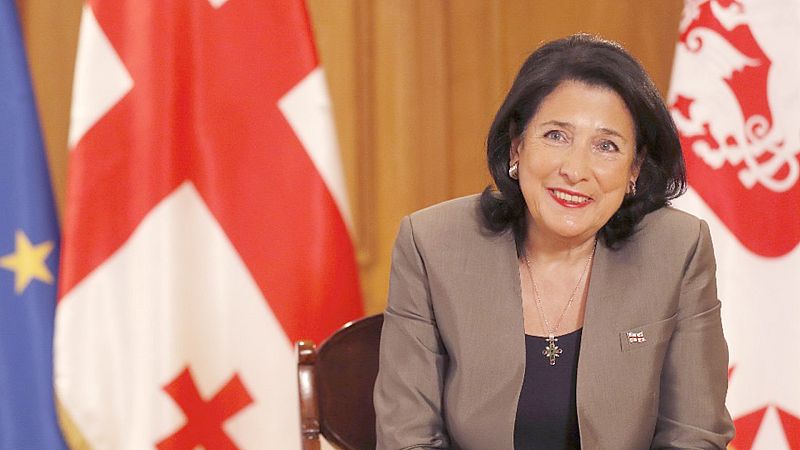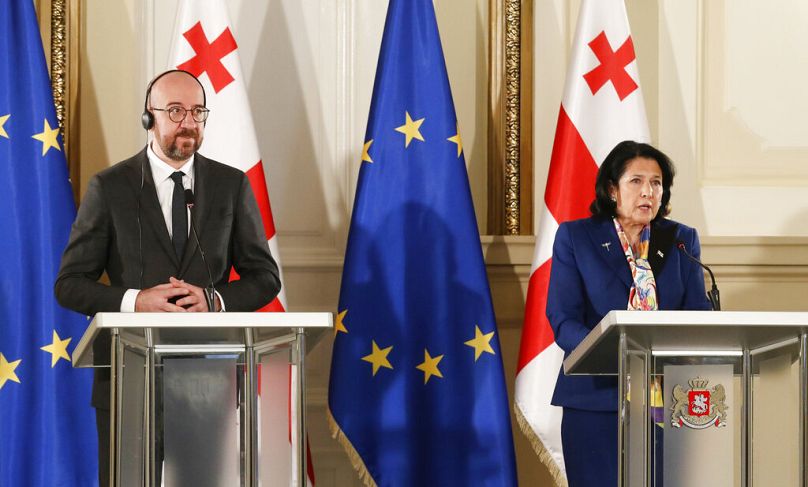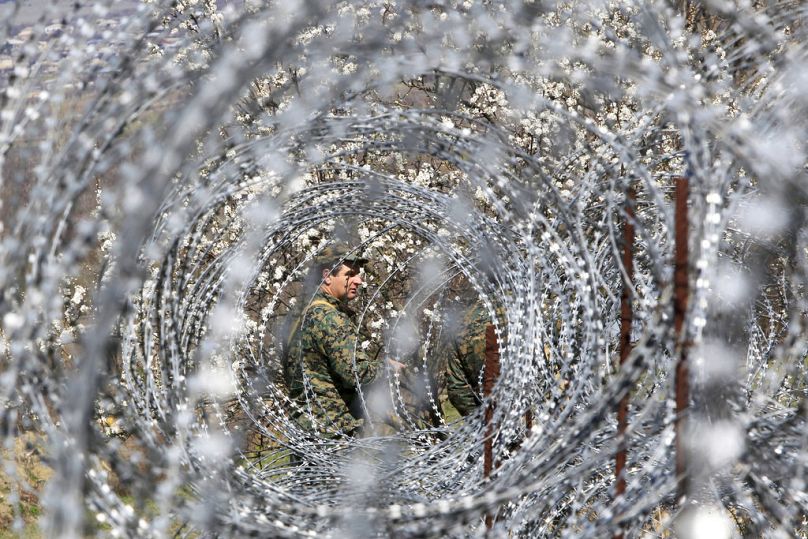Georgia can turn its EU fortunes around, President Zourabichvili tells Euronews

Georgian President Salome Zourabichvili's trip to Brussels came with many headaches.
A former French diplomat, she is a staunch pro-European and opposes the pro-Russian drift of the current majority.
Yet, after Georgia became a candidate country for EU membership late last year, together with Ukraine and Moldova, Brussels has frozen the talks with Tbilisi due to a controversial bill brought on last June by its ruling pro-Russian majority.
The law is a copy of a Russian measure set to drastically restrict the activity of the foreign-funded NGOs.
Then, this September, the parliament adopted the so-called "Family Values" law that brought numerous obstacles to the rights of the LGBTQ+ community — another close copy of existing Russian legislation.
Zourabichvili blocked the first laws and did not sign the second one. The parliament overruled her twice, and the assembly speaker signed it this Thursday.
Now, as the upcoming elections in October loom, the country in the South Caucasus remains split between the current government's pro-Russian Georgian Dream party and a fragmented pro-EU opposition.
The opposition is frayed itself, torn apart by personal rivalries and diverging ideological bases that led to its defeat in the past.
Speaking to Euronews' Sergio Cantone during her trip to Brussels, Zourabichvili explained the burning issues plaguing the country, its relations with Moscow — which still occupies one-fifth of its territory — and why the EU should offer its full support to the opposition during the last weeks of the electoral campaign.
Euronews: Is your European tour linked to the late October parliamentary elections? Why are these elections crucial?
Salome Zourabichvili: Absolutely. These elections are very important because they will determine, for the foreseeable future at least, the fate of Georgia's European future and of our path towards EU integration through the opening of the negotiations.
It was the case for Ukraine and Moldova, and it should have been the case for Georgia had it not started deviating from this path.
I expect that the Georgian population remains faithful to what they have wanted since our independence (in 1991).
80% of the population, through all the polls, have never changed their opinion. They always wanted a European future, Euro-Atlantic integration.
Euronews: Was the pro-Russian turn of the government due to external pressure?
Zourabichvili: It is very difficult to answer, at least regarding the Georgian government. However, this vote is de facto a referendum: yes to Europe, or a return to a slightly uncertain past.
You were asking about my trip to Europe. I am actually visiting Berlin, Warsaw, Brussels, and Paris.
What I would like to get from our partners and from my meetings is to know if the Georgian population confirms its desire for a European destiny.
If so, may our partners be ready to resume the accession process very quickly, which should lead us to the opening of negotiations next year, in June, if possible, at the European Council.
Euronews: Brussels froze the negotiations for Georgia's accession last June as a consequence of a controversial bill that violated EU principles and was set to restrict and control the activities of foreign-funded NGOs. Was it a copy of a Russian law?
Zourabichvili: Yes, it is a law intended, as it was in Russia, to control non-governmental organisations and civil society through so-called requests for transparency on foreign funding, which many non-governmental organizations obviously benefit from.
This concerns all the organisations, even the humanitarian organisations, and especially the organizations that have been working for thirty years in Georgia to help build institutions and, in fact, forging the Georgian state.
They are all threatened by this law used in Russia, which all started with a law for the transparency of foreign organisations' financing.
Euronews: As president of Georgia, how does the cohabitation with the current government work for you? It is a government that has chosen to be close to Moscow, which is not exactly your position, if I'm right?
Zourabichvili: Not only the government. The Georgian authorities made a 180-degree turn, I would say, since their original claim and campaign were very pro-European, like all regimes in Georgia since the independence.
Euronews: So what happened?
Zourabichvili: You should ask them what happened. Was there pressure from Russia? Did the Ukrainian war play a role, and in what way?
But the reality is there. The vast majority of the Georgian population demonstrated in the streets.
And that is precisely why the elections should confirm at the ballot box what the population said in the streets last March.
Euronews: How do you see the position of the EU, which decided to freeze your country's path to the bloc?
Zourabichvili: I am so disheartened that the EU process has been frozen. But I understand it because the Georgian authorities did not listen to the calls by the European authorities, all our European partners, and all the European organisations with which we have partnered for 30 years now.
Therefore, they did not follow this advice and maintained this law despite my veto, which allowed them once again to reconsider, amend, or withdraw it.
The freeze was to be expected. My concern today, in fact, is to ask whether, as I hope, the elections confirm what the population said in the street, namely that they do not want this law or these new directions that separate us from the European Union.
Euronews: If the pro-European opposition parties win this election, will they have enough MPs to create a government?
Zourabichvili: There are four pro-European parties that, according to the polls, should add up to around 60% (of support). So they could form a coalition, at least in the parliament.
I proposed to these parties to unite, not among themselves, because they represent different political families.
Yet, uniting around what we call the "Georgian Charter" is a recipe for returning to the European path.
These four parties signed the charter, which is, practically, their action plan for the next nine months to reconnect with our European partners.
Euronews: What are you asking from Brussels in terms of these elections?
Zourabichvili: We have one month left. Europe can do nothing but confirm, and this is what I am asking in this trip, that if the elections are won by the pro-European parties if the charter is implemented very quickly after the elections, and as soon as the parliament is formed, the European Union will resume the enlargement negotiations where they were left off.
Euronews: Aren't you afraid of the electoral fraud to be used to change the results?
Zourabichvili: Electoral fraud through the use of various administrative resources is already a known phenomenon. It is also measurable.
So, we pretty much know that in our projections of 60% (will vote) for the pro-Europeans and 40% for the ruling party, the fraud hypothesis is already more or less included in these.
In these figures, it is the people who work for the public services who have interests or concerns about their jobs.
So, all of this is more or less well-known. As long as it is peaceful and the population remains mobilised as it is today, the result should be a victory for the pro-Europeans.
Euronews: If we look at Georgia's geographical and geopolitical position, we understand why these elections matter for Europe.
Zourabichvili: Absolutely. It is important, I would say, to begin with our immediate neighbour, Armenia, which is now in the process of resuming its relations with the European Union and accelerating them.
And of course, taking into account the map, Armenia's links with Europe, it involves Georgia and a Georgia that is also pro-European.
Second, it is very important for the Black Sea because it is one of the issues in the conflict with Ukraine. However, the Georgian Black Sea coast is essential for the European Union to implement all the connectivity infrastructure projects that are part of the European projects.
And that is only possible if there is a stable, peaceful, and I would say, collaborative Black Sea.
Then, practically at the same time as us, there are the elections in Moldova, another major issue. And that is the future of European enlargement, too, with Ukraine waging these last major battles.
Euronews: One-fifth of Georgian territory, in Abkhazia and South Ossetia, has been occupied by Moscow since 2008, and the Russians are planning to construct a naval base in Abkhazia.
Zourabichvili: It is part of their project and a bit of provocation to maintain or establish a bridgehead on the Black Sea.
That is why it is very important to consolidate Georgia and its European path today, to consolidate its shoreline, and to construct the ports of an axis that should also interest European investors and our US partners as an element of this stability.
Euronews: When we talk about Georgia, we always think about Russian pressure and Russia's role. However, there is also Iran, which is not far away, with whom the government has recently established some relationships.
Zourabichvili: We've always had, I would say, a stable relationship with our Iranian neighbour, without very close relationships.
But we have economic relationships, and I think what has happened recently with the Georgian authorities is that the prime minister has been a bit more open with the Iranian authorities than usual.
And it is part of this display of foreign policy where we are getting closer to Russia, to Iran, to all the countries that are not great friends of our European and US partners.
So that's a political game. But with Iran, we have always tried to maintain a stable relationship without confrontation. And so far, we've always been successful.
Euronews: Aren't there migrants from Russia and Iran coming to Georgia?
Zourabichvili: There is not an increasing number of Iranian migrants. There were periods when there were many more with the perspective of investing in Georgia and for reasons that I am not very familiar with.
It seems a lot less attractive for them nowadays. And it also seems less attractive to the Russians.
We had a very big wave from the beginning of the war in Ukraine, especially after the mobilisation announcements, that brought a lot of young Russians to Georgia.
Some settled, and others went to other regions, mainly in the Middle East but also Europe, and a number returned when mobilisation dwindled a little bit.
Today, the number that remains in Georgia is around 60,000 Russians who are more or less permanently settled there and with whom, in reality, there are practically no incidents, even though the Georgian population is not enthusiastic about Russia.
However, regarding the Russians who are coming to settle, there was no real conflict, even though they would undoubtedly deserve a bit more careful monitoring by the authorities. Because among these 60,000, there must surely be people who serve interests other than ours.
Euronews: After the elections, you will still have an institutional role to play in the composition of the government. Do you already have an idea about how to craft a coalition with a rather fragmented opposition?
Zourabichvili: I have an idea that is not about the composition. The parties concerned, as I said, have quite different characteristics and visions, except for their European program. It will be quite difficult to proceed at a fast pace, and we are not used to coalition governments.
So, I am proposing that they form a technical government responsible for supporting Georgia until the negotiations (with Brussels) begin.
The program is well known. It is a set of measures to be taken to comply with the various European recommendations.
That can be the road map for the first period, the time for these parties to reflect and agree on what the coalition government will be like at the end of this period.
I think this is the most stable transition formula. We have no experience with a coalition government, except during the first independent republic. So, this needs to be thought through carefully.
Today



